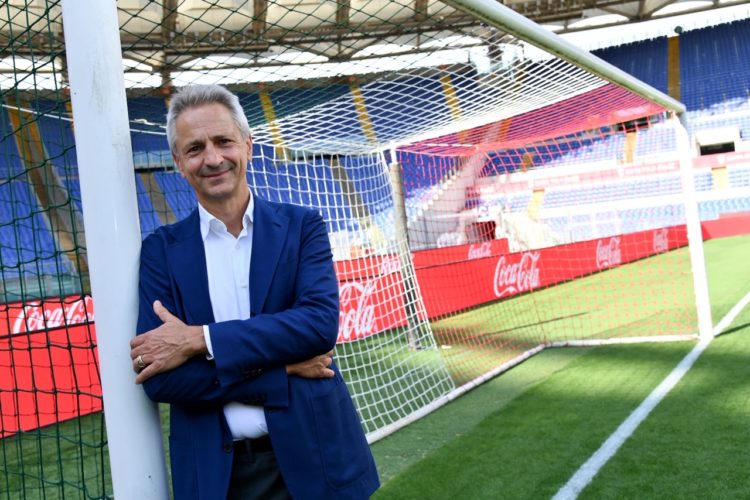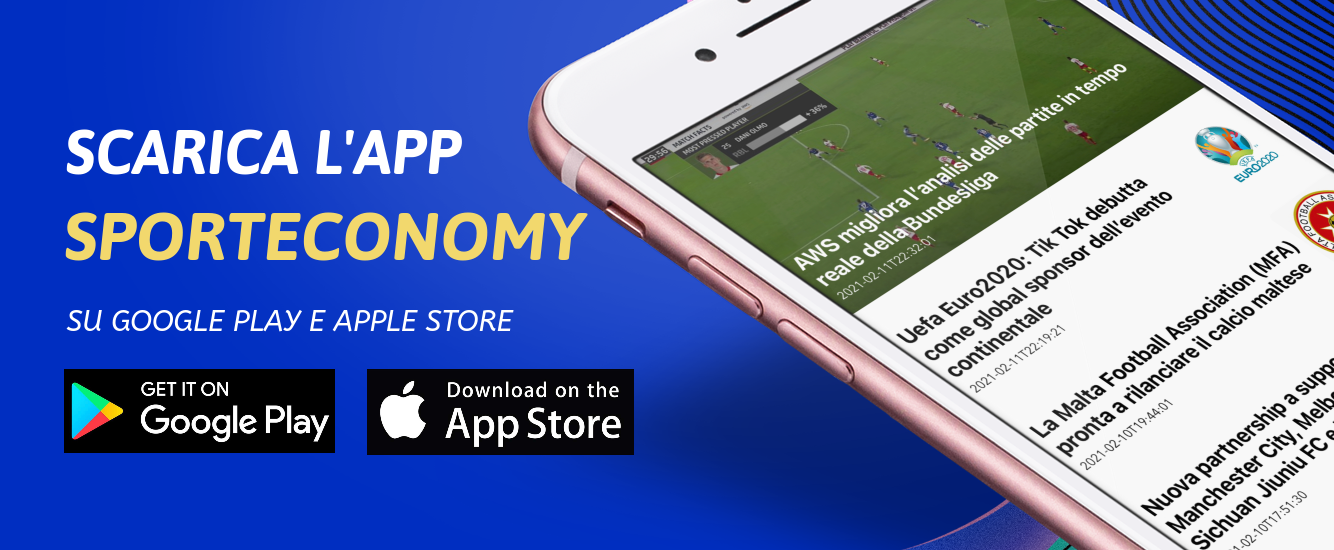All newsCalcioCalcioCalcio.InternazionaleEconomia E PoliticaEmergenza CoronavirusEventihome pageIstituzione e AttualitàPrurito calcisticoPunto e a CapoSerie A - Serie BSponsorshipSport Business
Dal Pino (Lega calcio Serie A) is the “game changer” of Italian football?
An interesting interview of Paolo Dal Pino (photo) – president of Lega calcio Serie A to the international northamerican website TheAthletic.
The end of the interview is the real key-point: “Transforming Serie A into the No 1 league in the world will take time,” Dal Pino says. “But if we do the right things, we can accelerate.”
If you follow football, even casually, there’s a strong chance you can name the chairmen of the Premier League, La Liga and the Bundesliga. For a long time, that has not been something that could be said of Serie A. The league had little or no voice on the international stage. It looked inward instead, often mired in a provincial, Italy-centric mindset. The perception of the president’s role was ceremonial without any apparent expectation to sell Serie A around the world.
The cheerful Paolo Dal Pino is determined to change that during his term in office. The time has come for the league to broaden its horizons. “I want to get Serie A back to the good old days, the old glories,” he says jovially. “I wish (the other top five leagues) all the best. But we want to be better than them.” To realise that ambition, the league needs a truly global approach. The pandemic has presented a series of domestic obstacles for Dal Pino to cross but he has not allowed it to distract from his main focus.
The seven months he has spent in the job have arguably been the most challenging from a logistical and structural point of view since the disruption caused by the Second World War. Italy was the first European country to be impacted by COVID-19 and Dal Pino had little or no reference points to guide a response. Fulfilling every fixture and bringing the championship to a close in that environment constitutes success, particularly as leagues such as Ligue 1 chose to curtail rather than continue.
“The best moment of the season,” Dal Pino says, “was to see the happiness of the players as we gave out the awards and presented the scudetto on the final day. At that point, we thought, ‘This is done. We did it’.”
Enjoying a few days vacation on the island of Ponza when The Athletic calls, Dal Pino isn’t in full relaxation mode. He spent the morning in discussion with UNAR, the government’s anti-racism office, as part of the league’s renewed efforts around prevention and the protection of its players.
He is mindful Serie A must do a better job when it comes to sanctioning abuse. Many deplorable incidents and gaffes have undermined confidence in the league and brought justified criticism but Dal Pino is making the fight a priority. “We are in favour of eradicating this everywhere. The guarantee I can give you is that we will kill any discriminatory behaviour,” Dal Pino says.
In parallel, his team have been working on plans to bring fans safely back to stadiums too, delivering a 400-page study for the Italian Football Federation and the government’s scientific committee to review. “Ten days ago I was saying: ‘How come nightclubs and places like the Verona Arena are open for shows, concerts are going on but you can’t allow at least 5,000 fans — that’s one every eight seats — to go watch Juventus win the scudetto?’ Our government is very cautious and we want to be cautious too. But we also want to do the right thing, which is different from only being cautious.”
While Serie A awaits the green light for reduced, social-distanced attendances at next season’s matches, much-needed progress on the construction of new stadia and the redevelopment of existing infrastructure has also been made. Encouragingly, an amendment to the stadium law was passed by the government this week that should facilitate the projects started by Roma, AC Milan, Inter Milan and Fiorentina, who wish to give their fans a privately-owned state-of-the-art home — rather than council-owned, rented accommodation.
In the era of financial fair play, when clubs can only spend what they earn, the lack of game-day cash compared with competitors from the other top five leagues has left Italian teams far too dependent on the churn of player-trading and saturating TV money. Dilapidated infrastructure has held Serie A back, with five of the league’s grounds set to celebrate their 100th birthdays in the next decade. “I stand side-by-side with Rocco Commisso (the Fiorentina owner) and all the other club owners who are fighting bureaucracy in their efforts to invest money in stadiums,” Dal Pino says. “We now have a unique and historic opportunity and we can’t miss it.”
However, as Juventus’ story tells us, maximising the Allianz Stadium may give you an edge over the competition in Serie A but the full and latent potential of the league needs releasing as a whole if it is to close the gap with its rivals. Otherwise, Juventus’ scrap to stay in the Deloitte Money League’s top 10 may eventually fail and no one else from Italy will break into it. The impact of COVID-19 has laid bare vulnerabilities in industries all over the world, which is why Dal Pino is seizing the opportunity in adversity to make the league confront issues it has too long avoided and rethink the paradigm.
“The cultural change of an organisation is huge,” he says. “Huge.” To affect it, Serie A needs to streamline and speed up the decision-making process within the league. Dal Pino is keen to highlight the unanimity with which the league’s shareholders backed him in almost all the difficult choices he had to make in recent months, but he also stresses that the governance of Serie A today is “simply not efficient”, clarifying: “We still have to eradicate certain behaviours of prevarication. Generally, though, there are great entrepreneurs within the league already who believe and invest in our sport.”
Dal Pino wants the league to break into a sprint, catch up and overtake the competition. Such advances are hard when there are “people trying to pull your jacket” and hold Serie A back. For that reason, he strongly believes private equity can help. “Sometimes you need a partner that helps you with temporary management, execution and a globally-focused approach,” he says. Dal Pino wants Serie A to think of itself as an entertainment production studio, which develops its own bespoke content through a new media company.
“In the past, Serie A worked with agencies and intermediaries,” he says. “I don’t see the value in this. We should keep the value in-house. I do not doubt that. I just need to understand now whether our clubs prefer us to do it by ourselves or with the help of private equity, which of course is my preferred route. In uncertain times such as these, having financial stability and access to a global network is invaluable.”
Bids from several private equity firms for a minority stake in the new media company are currently under review, with a decision expected by the end of the month. “We were in a situation where Sky was not paying (the final instalment of last season’s TV rights) and we were not playing football,” he says. “We go from Sky Italia saying it would renew the contract in the new tender at 20 or 10 per cent less, to suddenly now talking about new initiatives that will allow us to take control of our destiny and be an active player in all this. I see a lot of value in the OTT (internet streaming services) side of things, I see a lot of value in data and our CEO will have to work on all these things with the mentality of a media company; something that today is not part of the league’s characteristics.”
The process has “given Serie A a breath of fresh air” and the league feels like it is close to turning a corner. When The Athletic asks what the next 10 years hold for Serie A, Dal Pino replies: “We have to double our revenues. You wanted to know about 10 years’ time: it’s feasible we do it in seven or eight years. In my mind, it’s earlier than that.”
His confidence derives from the enduring brand recognition of Italian football. Dal Pino knows this from his experience running Pirelli and Telecom Italia’s operations in South America. “If I hop in a cab in Rio de Janeiro, the taxi driver will see I’m Italian and say: ‘Paolo Rossi’ even though 38 years have passed (since Rossi’s hat-trick knocked Brazil out of the 1982 World Cup). In some industries, you have a problem, which is they don’t want your product. Now with soccer, they want it everywhere. It’s fantastic to be in a position to have a product that’s a door opener.”
Even when Serie A looks to be a closed shop, with Juventus winning the last nine league titles? “If I look at the other championships, particularly the gap between the first and second-placed teams, the fourth and the fifth, the league was quite balanced this season,” Dal Pino counters. “My wish is to have a Serie A that becomes more and more attractive for investors who love this sport and consider this sport a huge business if managed with the appropriate governance and management philosophy.
“Once we attract the right investors, the right players, the right sponsors, then greater competitive balance will follow. I take this opportunity to welcome Dan Friedkin (Roma’s new American owner), a charismatic person, a great entrepreneur, who I am sure will do good for our game. I hope we can become a reference for the industry.”
Restoring Serie A to its heyday won’t be easy and Dal Pino accepts “it’s a long journey”. But with all of the league’s top clubs under stable, forward-thinking ownership groups and a proactive globalist in Dal Pino shaking it out of its insular mentality, the mood is palpably optimistic.
“Transforming Serie A into the No 1 league in the world will take time,” Dal Pino says. “But if we do the right things, we can accelerate.” (source: TheAthletic.com)






No Comment